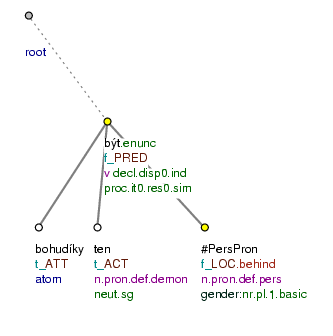Unlike other modifications, the modifications with the ATT functor characterize the communication situation, they signal communication functions of the utterance and they introduce pragmatic meanings into the utterance. They express speaker's attitudes like amazement, surprise, satisfaction, concern, indifference, regret etc.
NB! The functor ATT is also assigned to modifications that further specify the modal meanings of modal predicates. For more details see also Section 9.1.1.4, "Closer specification of modal meanings".
NB! For details on the syntactic nature of the ATT modifications see Section 11.1.3, "The semantic scope of modifications with the functors MOD and ATT".
Forms. Modifications with the ATT functor typically have a fixed lexical content, particularly in prepositional phrases. The basic forms of ATT modifications are:
-
adverbial and particle expressions.
Examples:
Je to bohudíky.
ATTza námi (=lit. Is it thank_God over -.) Fig. 7.42Díla s tématem synonymie jsou dnes již bohužel.
ATTnedostupná. (=lit. Works on - synonymy are today any_more unfortunately not_available.)Bude-li vláda vystřídána, je to samozřejmě.
ATTpro republiku významná událost. (=lit. Are-if (the) government replaced is it of_course for (the) republic (an) important event.)Vypovědět ji prostě.
ATTnelze. (=lit. To_expel her simply is_impossible.)To je fakticky.
ATTzlé. (=lit. That is really bad.)Je to náhodou.
ATThezké. (=lit. Is it actually nice.)Nevím ovšem.
ATT, s čím přijedou Číňanky. (=lit. (I) do_not_know nevertheless with what will_come_up (the) Chinese.)Pravda.
ATT, pak přišla první konkrétní čísla. (=lit. Truly, then came fist concrete figures.)Jenom.
ATTse opovaž. (=lit. Just you dare.)Čiší z nich konec.
ATTkonců i neschopnost vlády. (=lit. (They) radiate -- after all also (the) incapability (of) (the) government.)Copak.
ATTpeníze, o ty by nebylo. (=lit. Well, money, -they wouldn't matter.)NB! The cases of so-called lexicalized parenthesis are also represented as
ATTmodifications (see Section 7.2, "Lexicalized parenthesis"). Examples:Dopadne to, doufejme.
ATTdobře. (=lit. Will_work_out it hopefully well.)To je, myslím.
ATT, náš pes. (=lit. That is I think our dog.)Víte.
ATT, to je složité. (=lit. (You) know it is complicated.) -
prepositional phrase.
The most common forms:
bez+2 Taková je bez nadsázky Honda Prelude 3.2. (=lit. Like_that is without (any) exaggeration what (the) new Honda Prelude 3.2.); bez obalu; (=lit. without cover; directly) k+3 Zákazník ke své škodě málokdy přemýšlí o vlastnostech nabízeného tovaru.(=lit. (A)customer to his/her detriment hardly_ever thinks about (the) properties (of) (an) offered product.); k plné spokojenosti (=lit. to his/her satisfaction) po+6 po pravdě (=truly) s+7 To vše a mnohé jiné nás škola s radostí naučí. (=lit. All that and much more us school with joy will_teach.) v+6 Ve skutečnosti nezbyl téměř kámen na kameni. (=lit. - Actually (there) was_left hardly (a) stone standing.); Oba systémy byly v podstatě totožné. (=lit. Both systems were - actually identical.) -
noun in a non-prepositional case form.
The most common forms:
instrumental To je svým způsobem také podivuhodné (=lit. This is in_a_way also remarkable) ; Přišla v době, kdy se shodou okolností Barák loučil. (=lit. she came -- when by coincidence Barák was_saying_goodbye.) -
subordinating conjunction in the function of a particle .
Examples:
Když.
ATTale vy to nevidíte dobře. (=lit. - But you it cannot_see right.)Vždyť.
ATTmáme kapacitu stadionu 5000 míst (=lit. But is (the) capacity (of) (the) stadium 5000 seats.)Že.
ATT, vy si ze mě děláte legraci? (=lit. Don't_you, you - of me are_making fun?)
Agreeing form of an adjective. With nouns referring to events (nouns ending with -ní and tí; see Section 2.4.3.3, "Functors assigned to the non-valency modifications of nouns referring to events") the modifications with the ATT functor can also be expressed by an agreeing form of an adjective (only marginally).
Examples:
údajné.ATT poškozování zájmů státu (=lit. (the) alleged harm (of) interests (of) (the) state)
takzvané.ATT podnikání (=lit. (the) so-called business)
Border with the MANN functor. ATT modifications can be formally close to other modifications. There is a frequent homonymy between the functors ATT and MANN. In such cases it is typical that the modification with the ATT functor (meaning: "it was simple, fair etc. that he did it") occurs clause-initially while the modification with the MANN functor (meaning: "it was simple, fair etc. in what way he did it ") occurs after the verb. Compare:
-
Prostě.
ATTnepřišel.(=lit. Simply (he) did_not_come.) -
Oblékl se prostě.
MANN(=lit. (He) - dressed simply.)
In ambiguous cases the modification is assigned one of the functors according to the context. Cf.:
-
Prostě se oblékl a šel tam. (=lit. Simply (he) - dressed and went there.)
If the meaning is: he just dressed and went there, the node representing the adverb prostě (=simply) is assigned the
ATTfunctor; if this adverb characterizes the way in which somebody was dressed, the node is assigned theMANNfunctor.
Border with the ACMP functor. Apart from the most common homonymy with the MANN functor, ATT modifications often compete with several other functors, particularly when there is also formal homonymy. This happens e.g. with the prepositions s+7 and bez+2, which both primarily express the ACMP meaning (see Section 6.1, "ACMP"). The choice between the two functors (ACMP and ATT) can be in certain cases highly problematic. The problem which of the two functors is closer to the meaning of the modification according to the available context always needs careful consideration: The modification with the ATT functor has the meaning of the speaker's attitude. The speaker's interest is always present in the event. Cf.:
-
Odešel s kloboukem.
ACMPna hlavě. (=lit. (He) left with (a) hat on (his) head.) -
Odešel s povzdechem.
ACMP(=lit. (He) left with (a) sigh) -
Udělám to s radostí.
ATT(=lit. (I) will_do it with pleasure)
Border with the RHEM functor. ATT modifications can border on rhematizers. For details see also Section 6.1.2, "Homonymy: rhematizer - modal expressions (ATT and MOD)".
